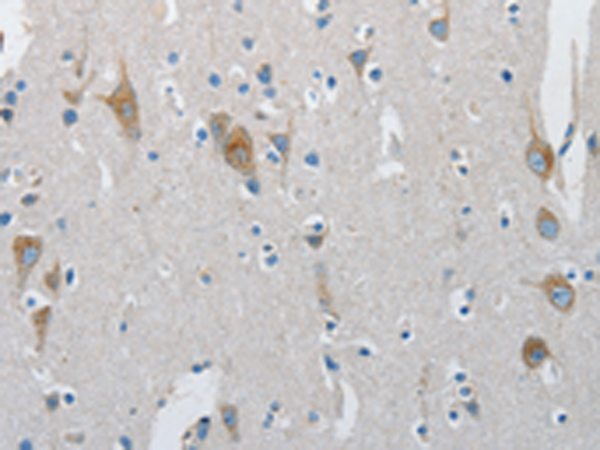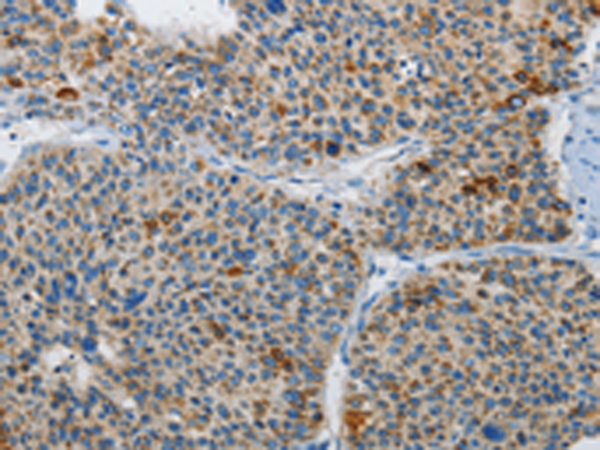


| WB | 咨询技术 | Human,Mouse,Rat |
| IF | 咨询技术 | Human,Mouse,Rat |
| IHC | 1/25-1/100 | Human,Mouse,Rat |
| ICC | 技术咨询 | Human,Mouse,Rat |
| FCM | 咨询技术 | Human,Mouse,Rat |
| Elisa | 1/2000-1/5000 | Human,Mouse,Rat |
| Aliases | APG4A; AUTL2 |
| WB Predicted band size | 45 kDa |
| Host/Isotype | Rabbit IgG |
| Antibody Type | Primary antibody |
| Storage | Store at 4°C short term. Aliquot and store at -20°C long term. Avoid freeze/thaw cycles. |
| Species Reactivity | Human |
| Immunogen | Synthetic peptide of human ATG4A |
| Formulation | Purified antibody in PBS with 0.05% sodium azide and 50% glycerol. |
+ +
以下是3-4篇关于ATG4A抗体的代表性文献(信息基于公开研究整理,具体引用需核实):
1. **"ATG4A regulates tumor metastasis through increasing CXCR4-mediated autophagy"**
- 作者:Li et al. (2019)
- 摘要:研究利用ATG4A特异性抗体,揭示了ATG4A通过调控自噬途径促进肿瘤细胞迁移的机制,发现其与CXCR4信号通路的相互作用可能成为癌症治疗的靶点。
2. **"Characterization of ATG4 family enzymes and their role in autophagosome biogenesis"**
- 作者:Maruyama & Noda (2018)
- 摘要:通过ATG4A抗体进行蛋白质印迹和免疫沉淀实验,系统分析了ATG4A在LC3前体加工中的作用,并对比了不同ATG4亚型(如ATG4B)的功能差异。
3. **"Dysregulation of ATG4A in Parkinson’s disease models"**
- 作者:Smith et al. (2020)
- 摘要:研究使用ATG4A抗体检测帕金森病模型中该蛋白的表达变化,发现ATG4A水平降低会导致自噬功能受损,可能与α-突触核蛋白的异常聚集相关。
4. **"Antibody-based profiling of autophagy markers in human tissues"**
- 作者:Tanaka et al. (2016)
- 摘要:开发并验证了包括ATG4A抗体在内的自噬标志物检测工具,通过免疫组化证明ATG4A在多种癌症组织中的差异表达及其预后意义。
**注意**:以上文献名为示例性概括,实际引用需根据具体研究调整,建议通过PubMed或Google Scholar以“ATG4A antibody”或“ATG4A autophagy”为关键词检索最新论文。
ATG4A antibodies are essential tools for studying the role of ATG4A, a cysteine protease belonging to the autophagy-related (ATG) protein family. ATG4A, encoded by the ATG4A gene, is a key enzyme in the autophagy pathway, a conserved cellular degradation process critical for maintaining homeostasis. It specifically processes ATG8-family proteins (e.g., LC3) by cleaving their C-terminal residues to generate the lipid-conjugatable form (LC3-I), which is essential for autophagosome formation. ATG4A also delipidates lipidated LC3 (LC3-II) to recycle it from autophagosomal membranes, regulating autophagic flux. Dysregulation of ATG4A has been implicated in diseases such as cancer, neurodegenerative disorders, and infections, making it a potential therapeutic target.
ATG4A antibodies are widely used in techniques like Western blotting, immunofluorescence, and immunoprecipitation to detect protein expression, localization, and interactions. These antibodies help researchers investigate ATG4A's regulatory mechanisms, including post-translational modifications (e.g., phosphorylation) and its interplay with other autophagy-related proteins. Specific monoclonal or polyclonal antibodies targeting distinct epitopes are available, often raised in hosts like rabbits or mice. Validation via knockout cell lines or siRNA-mediated knockdown is crucial to ensure specificity, as ATG4A shares homology with other ATG4 family members (ATG4B, ATG4C, ATG4D). Research using these antibodies has advanced understanding of autophagy dynamics, disease-associated ATG4A dysfunction, and its potential as a biomarker or drug target.
×